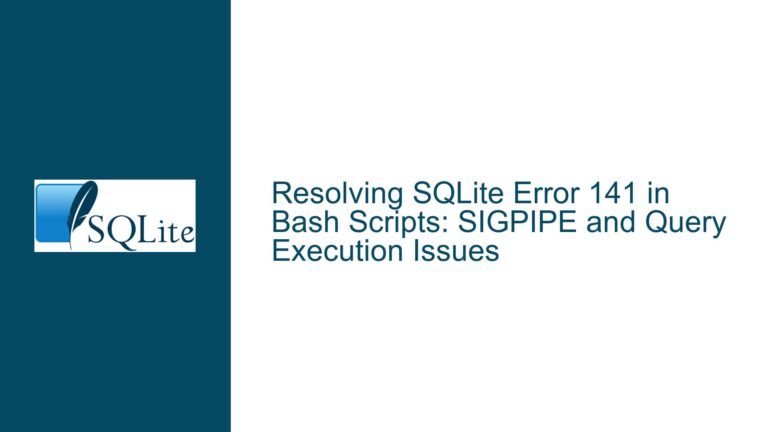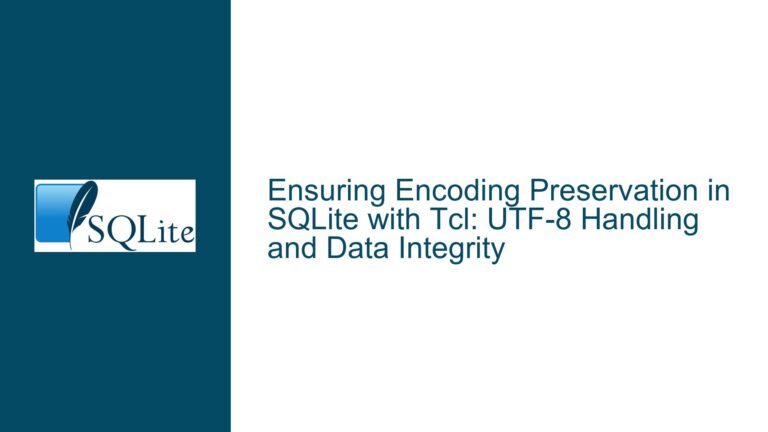ALTER TABLE RENAME COLUMN Fails Due to SQLITE_MAX_FUNCTION_ARG Limit
Understanding the SQLITE_MAX_FUNCTION_ARG Limit and Its Impact on ALTER TABLE RENAME COLUMN
The SQLITE_MAX_FUNCTION_ARG compile-time option in SQLite defines the maximum number of arguments that can be passed to a SQL function. This limit applies to both user-defined functions (UDFs) and internal functions used by SQLite. When this limit is set too low, certain SQLite operations, such as ALTER TABLE RENAME COLUMN, may fail unexpectedly. This occurs because internal functions like sqlite_rename_column require a specific number of arguments to execute successfully. If the SQLITE_MAX_FUNCTION_ARG limit is lower than the number of arguments required by these internal functions, SQLite will throw an SQLITE_ERROR with a message indicating "too many arguments on function."
The sqlite_rename_column function, which is invoked during an ALTER TABLE RENAME COLUMN operation, requires exactly nine arguments. These arguments include details such as the SQL schema definition, the table name, the column name, and other metadata necessary for the renaming operation. If SQLITE_MAX_FUNCTION_ARG is set to eight or lower, the function call will fail, causing the entire ALTER TABLE RENAME COLUMN operation to abort. This behavior is not immediately intuitive, as the limit is typically associated with user-defined functions rather than internal operations.
The issue is further complicated by the fact that the SQLITE_MAX_FUNCTION_ARG limit is often set based on security recommendations in the SQLite documentation. These recommendations suggest setting the limit to a lower value to mitigate potential risks associated with excessive function arguments. However, they do not explicitly account for the requirements of internal functions like sqlite_rename_column. As a result, developers who follow these recommendations may inadvertently break core SQLite functionality without realizing the cause.
Why SQLITE_MAX_FUNCTION_ARG=8 Breaks ALTER TABLE RENAME COLUMN
The root cause of the issue lies in the interaction between the SQLITE_MAX_FUNCTION_ARG limit and the internal sqlite_rename_column function. When ALTER TABLE RENAME COLUMN is executed, SQLite internally generates a call to sqlite_rename_column to update the schema definition stored in the sqlite_master table. This function requires nine arguments to perform its task:
- The SQL schema definition (
sql). - The object type (
type). - The object name (
name). - The database name (
main). - The table name (
MYTABLE). - The column index (
2). - The new column name (
MYCOLUMN). - A flag indicating whether the column is part of a primary key (
0). - A flag indicating whether the column is part of a unique constraint (
0).
If SQLITE_MAX_FUNCTION_ARG is set to eight, the function call will fail because it exceeds the allowed number of arguments. This failure manifests as an SQLITE_ERROR with the message "too many arguments on function sqlite_rename_column." The error is particularly confusing because it does not directly reference the ALTER TABLE RENAME COLUMN statement or provide clear guidance on resolving the issue.
The problem is exacerbated by the fact that the SQLITE_MAX_FUNCTION_ARG limit is often set based on security recommendations that do not account for internal function requirements. For example, the SQLite documentation suggests setting SQLITE_MAX_FUNCTION_ARG to eight to reduce the risk of stack overflows or other issues caused by excessive function arguments. While this recommendation is sound in principle, it does not consider the needs of internal functions like sqlite_rename_column, which require nine arguments to operate correctly.
Resolving the Issue: Setting SQLITE_MAX_FUNCTION_ARG to 9 or Higher
To resolve the issue, developers must ensure that SQLITE_MAX_FUNCTION_ARG is set to at least nine. This value accommodates the nine arguments required by the sqlite_rename_column function and allows ALTER TABLE RENAME COLUMN operations to proceed without errors. The following steps outline how to address the problem:
Recompile SQLite with SQLITE_MAX_FUNCTION_ARG=9: If you are using a custom build of SQLite, modify the compile-time options to set
SQLITE_MAX_FUNCTION_ARGto nine or higher. This ensures that internal functions likesqlite_rename_columncan execute successfully.Update Documentation and Recommendations: If you are responsible for maintaining SQLite documentation or providing recommendations to other developers, explicitly state that
SQLITE_MAX_FUNCTION_ARGshould be set to at least nine to avoid breaking core functionality likeALTER TABLE RENAME COLUMN. This clarification helps prevent others from encountering the same issue.Test for Compatibility: After updating the
SQLITE_MAX_FUNCTION_ARGlimit, thoroughly test your database schema migration scripts to ensure that all operations, includingALTER TABLE RENAME COLUMN, work as expected. This step is particularly important if you are working with a large or complex database schema.Consider Future-Proofing: While setting
SQLITE_MAX_FUNCTION_ARGto nine resolves the immediate issue, consider whether a higher value might be necessary in the future. For example, if you plan to use user-defined functions with many arguments or if SQLite introduces new internal functions with higher argument counts, a higher limit may be warranted.Monitor SQLite Updates: Keep an eye on SQLite updates and release notes for changes related to
SQLITE_MAX_FUNCTION_ARGor internal function requirements. The SQLite development team may adjust the default value or provide additional guidance based on user feedback.
By following these steps, developers can ensure that their SQLite builds and database migration scripts are robust and free from issues related to the SQLITE_MAX_FUNCTION_ARG limit. Additionally, updating documentation and recommendations helps prevent others from encountering the same problem, contributing to a more reliable and user-friendly SQLite ecosystem.
In summary, the SQLITE_MAX_FUNCTION_ARG limit is a critical compile-time option that can impact both user-defined and internal SQLite functions. When set too low, it can break core functionality like ALTER TABLE RENAME COLUMN, leading to confusing errors and failed schema migrations. By understanding the requirements of internal functions like sqlite_rename_column and setting SQLITE_MAX_FUNCTION_ARG to an appropriate value, developers can avoid these issues and ensure smooth database operations.






